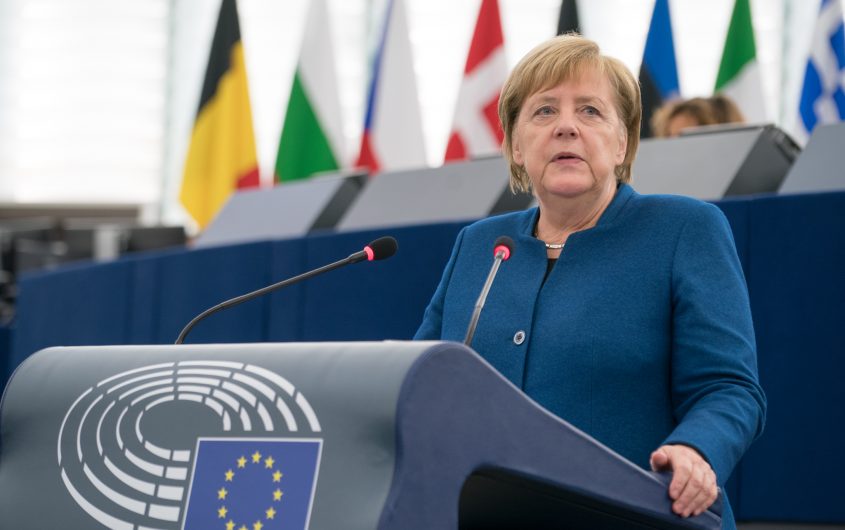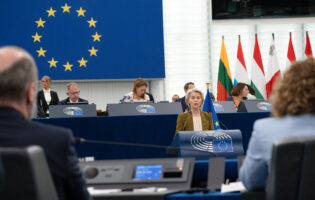
European Parliament via Flickr
AGI Asks: What is Angela Merkel’s Legacy for European Integration?

Alexander Privitera
AGI Non-Resident Senior Fellow
Alexander Privitera a Geoeconomics Non-Resident Senior Fellow at AGI. He is a columnist at BRINK news and professor at Marconi University. He was previously Senior Policy Advisor at the European Banking Federation and was the head of European affairs at Commerzbank AG. He focuses primarily on Germany’s European policies and their impact on relations between the United States and Europe. Previously, Mr. Privitera was the Washington-based correspondent for the leading German news channel, N24. As a journalist, over the past two decades he has been posted to Berlin, Bonn, Brussels, and Rome. Mr. Privitera was born in Rome, Italy, and holds a degree in Political Science (International Relations and Economics) from La Sapienza University in Rome.

Erik Jones
Robert Schuman Centre for Advanced Studies
Erik Jones is Director of the Robert Schuman Centre for Advanced Studies at the European University Institute.
He is also Professor of European Studies and International Political Economy at the Johns Hopkins School of Advanced International Studies (SAIS) – on extended leave. Professor Jones is author of The Politics of Economic and Monetary Union (2002), Economic Adjustment and Political Transformation in Small States (2008), Weary Policeman: American Power in an Age of Austerity (2012, with Dana H. Allin), and The Year the European Crisis Ended (2014). He is editor or co-editor of books and special issues of journals on topics related to European politics and political economy including The Oxford Handbook of the European Union (2012) and The Oxford Handbook of Italian Politics (2015). Professor Jones is co-editor of Government & Opposition and a contributing editor of Survival. His commentary has appeared in the Financial Times, the New York Times, and other major newspapers and magazines across Europe and North America.

Sophie Pornschlegel
Europe Jacques Delors
Sophie Pornschlegel is Director of Studies at Europe Jacques Delors, a Brussels-based think tank focusing on EU sustainability policies. She teaches a course on EU integration at Sciences Po Paris, is Policy Fellow at the Berlin-based think tank Das Progressive Zentrum, and author of the book Am Ende der gewohnten Ordnung: Warum wir Macht neu denken müssen (At the end of the known order: Why we need to rethink power) (Droemer, 2023). Her research focuses on two fields: EU institutions, rule of law, and democracy; as well as EU sustainability policies, in particular related to agrifood and trade. She previously worked as a Senior Policy Analyst at the European Policy Centre, and has previous experience at the European Commission, Westminster, and in a public affairs consultancy.

William Paterson
Aston Centre for Europe
Professor William Paterson is Honorary Professor of German and European Politics in its newly-established Aston Centre for Europe (ACE). at Aston University. He began his academic career as a Lecturer in Politics and International Relations at the University of Aberdeen and later moved to the University of Warwick as a Volkswagen Lecturer where, after a number of years, he was promoted to a Professorship in Politics. In 1990 Professor Paterson returned home to Scotland and to the University of Edinburgh where he was appointed Salvesen Professor of European Institutions and Director of its Europa Institute.
From 1994 - 2005, and again from 2006 to 2008, Professor Paterson was Professor of German Politics and Director of the Institute for German Studies at the University of Birmingham.
Professor Paterson has written or edited over 25 books and is the author of countless academic papers on European and German issues. Until late 2008, he also co-edited the world's leading scholarly journal on the EU, the Journal of Common Market Studies. He continues to co-edit three major book series with Palgrave. He is a Director of the Königswinter Conference (a series of annual bilateral British-German conferences which has been meeting since 1950). In March 2005, Professor Paterson was appointed Chairman of the German-British Forum in succession to Lord Hurd of Westwell.
Professor Paterson was awarded the German Order of Merit in March 1999. In June 1999 he was awarded an OBE in the Queen's Birthday Honours List for "scholarship in German studies." Academically, his career has been honored by lifetime achievement awards from the University Association for Contemporary European Studies (UACES), as well as from the International Association for the Study of German Politics (IASGP).
AGI Asks: What is Angela Merkel’s European legacy?
Erik Jones
Robert Schuman Centre for Advanced Studies
Angela Merkel will be remembered for many things, but her grudging pragmatism in response to the eurozone crisis is probably the most important legacy for Europe. As the global financial crisis broke in 2007 and 2008, Merkel was slow to recognize its significance. That was hardly unique. But the failure of Bear Sterns and the collapse of Lehman Brothers were impossible to ignore. Greek government bonds got into trouble very soon after Lehman in late 2008 and early 2009. Merkel let her finance minister, Peer Steinbrück, take the lead. Steinbrück promised the markets that no euro area government could be allowed to go bankrupt in a speech delivered in February and the tensions surrounding Greece receded.
Those tensions returned when Greece elected a new government the following November. By that time, Merkel led a different coalition. Her new finance minister, Wolfgang Schäuble, disagreed with his predecessor’s view of the Greek crisis. Schäuble argued that the Greek government should be subject to the discipline of the markets. Merkel agreed; Greek sovereign debt was a Greek problem. That decision brought tensions back into the markets. As those tensions deepened, it became obvious that something would have to be done. Merkel insisted, however, that the Greek government could only receive support once it lost access to the markets. That position all but ensured that Greece would need a bailout.
Merkel nevertheless remained wedded to the view that market discipline could ultimately solve the problem—for lenders as well as borrowers. She reached an agreement with French President Nicolas Sarkozy on private sector involvement. When they announced that agreement in October 2010, the crisis worsened. The Irish and Portuguese governments also sought bailouts. Then the Spanish and Italian governments got into trouble. Conditions worsened until the summer of 2012. That is when Mario Draghi gave his famous ‘whatever-it-takes’ speech. He did so with Merkel’s support.
In offering that support, Merkel reversed many of her previous positions. The ECB would step in to stop those forces that constitute ‘market discipline.’ Importantly, it would do so before—and not after—governments in distress lost access to the markets. In essence, Merkel acknowledged that national government finances are a European problem. This is essentially what Steinbrück had argued in February 2009. I often wonder if the eurozone crisis would have been less severe if Merkel had held onto that position. It is an interesting counterfactual.
What matters is that she changed her position only to change it back again. That could not have been easy. But Merkel’s grudging pragmatism made all the difference. We should all hope her successor will show similar flexibility.
Willie Paterson
Aston Centre for Europe
Famous German Chancellors fall into two categories: visionaries and crisis managers. Adenauer, Brandt, and Kohl represent the visionary chancellors. Visionary managers tend to enjoy greater prestige since they are associated with the existential issues of German Unity and European Integration. They are also associated with grand narratives that are accessible and can be painted in bold colors.
The outstanding crisis managers Helmut Schmidt and Angela Merkel lack these advantages. There are no instantly recognized grand narratives that pack an emotional punch. Schmidt was perceived as a technocrat, albeit at a very high level. Neither Schmidt nor Merkel produced a vision or a grand narrative. There are some obvious contrasts; Schmidt, together with Giscard d’Estaing, took the crucial first steps in what became the Economic and Monetary Union.
It is more difficult to point to permanent achievements of the Merkel chancellorship. Her handling of the Eurozone crisis where Germany at times played the role of reluctant hegemon was guided by a fairly narrow view of German interests and deepened the North-South split in Europe. Some of this may have been inevitable but it was made worse by Merkel’s failure to provide a vision in terms other than Sachzwang. She also pursued a mercantilist policy toward China and Russia. This has been combined with a failure to address German security deficits. Together they make Germany a weaker partner of the West.
In two instances Merkel departed from her normal caution. In the refugee crisis of 2015, Merkel abandoned her normal caution and took in more than one million refugees. Unfortunately, this initiative attracted little support from fellow EU members, and over time Merkel switched to negotiating side deals with Turkey, Morocco, and Libya. In the spring of 2020, Merkel and President Macron were the principal sponsors of a European Recovery Fund. It is not all clear that the scale is adequate to meet the post-pandemic challenge.
Internally, Merkel has weakened the stability of the German party system. Traditionally, it relied on coalitions between the three principal parties: the CDU/CSU, the SPD, and the Free Democratic Party. In her coalitions, Merkel drained support from her coalition partners. This tactic allowed her to win elections but made governmental formation difficult.
A survey of Merkel’s incumbency indicates a mixed picture. Perhaps her greatest triumphs were as the de facto leader of the European Council rather than as German Chancellor.
Sophie Pornschlegel
European Policy Centre
There are two narratives about Angela Merkel’s legacy in Europe: One is the narrative of the crisis manager, a skilled negotiator with a calm and pragmatic style that enabled the EU to go through the “crisis decade” from the financial crisis to the COVID-19 crisis. The other is the more critical narrative of Angela Merkel’s lack of strategic vision for the EU and lack of ambition in several policy fields, such as fighting climate change or safeguarding the rule of law.
While it is difficult to summarize sixteen years of European Councils, Merkel is likely to be remembered in Brussels for her management of the euro crisis and the migration crisis. While short-term solutions were found to those issues—controversial bailout packages with Greece and the EU-Turkey statement to keep refugees out of the EU’s territory—the long-term problems remain intact: There is still no significant reform of the eurozone and there is still no agreement on the relocation of refugees in the EU. While Germany is not solely responsible for this situation, this nevertheless shows that the last German government has failed to put sufficient political weight behind the reform proposals.
The lack of long-term European solutions to core EU policy issues is also due to the rather unambitious Franco-German relations in the past years. While it was a Franco-German agreement that laid the ground for the historic COVID-19 recovery plan in 2020, there has been little joint political willingness to move policy files forward. Especially the unique “window of opportunity” for collaboration, which was opened with French President Macron’s Sorbonne speech in 2017, was sorely missed by Germany—and with it a new impetus for Europe.
Looking ahead, the next German government will hopefully come up with a more ambitious EU policy than in the last coalition agreement, where only four pages were dedicated to the EU. If the EU is to increase its “capacity to act” in the coming years, the next German government—and in particular the chancellor—will have to present a clearer picture of what Germany wants to achieve in Europe.
Alexander Privitera
BRINK News & Università degli Studi Guglielmo Marconi
Angela Merkel’s departure from power will leave a void in German and European politics. Once hailed as the most powerful woman in the world, the outgoing German chancellor has introduced a different style in western politics, driven by level headedness rather than testosterone. Her biggest achievement may well be her ability to tame and marginalize the most extreme forms of demagoguery and nativist populism. Despite the relative success of the German far right in the wake of the refugee crisis of 2015, Germany’s political center managed to hold. In a time clouded by self-doubts in Western democracies, this is a big achievement. However, it came at a price.
Cautious by nature, Merkel fits the tradition of German politicians who are suspicious of grand plans. As one of her predecessors once famously remarked “if you have visions you need to go to the eye doctor.” Indeed, she never had a vision for her country or Europe, preferring to wait for a crisis to materialize before acting. This forced her to play catch up and to take a minimalistic, step by step approach when confronted with a new challenge. Her instinct told her to nudge public opinion rather than to present it with stark choices.
By attempting to tame rather than tackle multiple crises she allowed some to grow. This ultimately forced her to take big gambles. One notable example is the refugee crisis, when thousands of mostly Syrian nationals arriving in Greece risked putting that country and the Balkans under severe strain. Greece was just beginning to recover from the stress of the so-called sovereign debt crisis—which arguably had been exacerbated by the German insistence on imposing particularly harsh conditions in return for financial support—and Merkel feared that the refugee crisis might ultimately jeopardize the ability of Athens to recover and stay in the euro area. By unilaterally opening German borders to refugees, she mitigated the stress on Greece but increased it at home and in other EU countries, causing one of the biggest challenges in the history of the European Union.
At the same time, her moral and political compass meant that she never wavered on some fundamental priorities. She was a strong transatlanticist and repaired the relationship with the United States damaged by her predecessor. She was determined to keep Europe together, first by not standing in the way of the European Central Bank when its president promised to “do whatever it takes” to save the euro, then by pushing for an ambitious European, joint recovery fund to tackle the economic fallout of the COVID-19 pandemic. Both decisions could prove to be watershed moments in Germany’s and Europe’s history. She answered the call when events could have caused her steady hand to shake.









